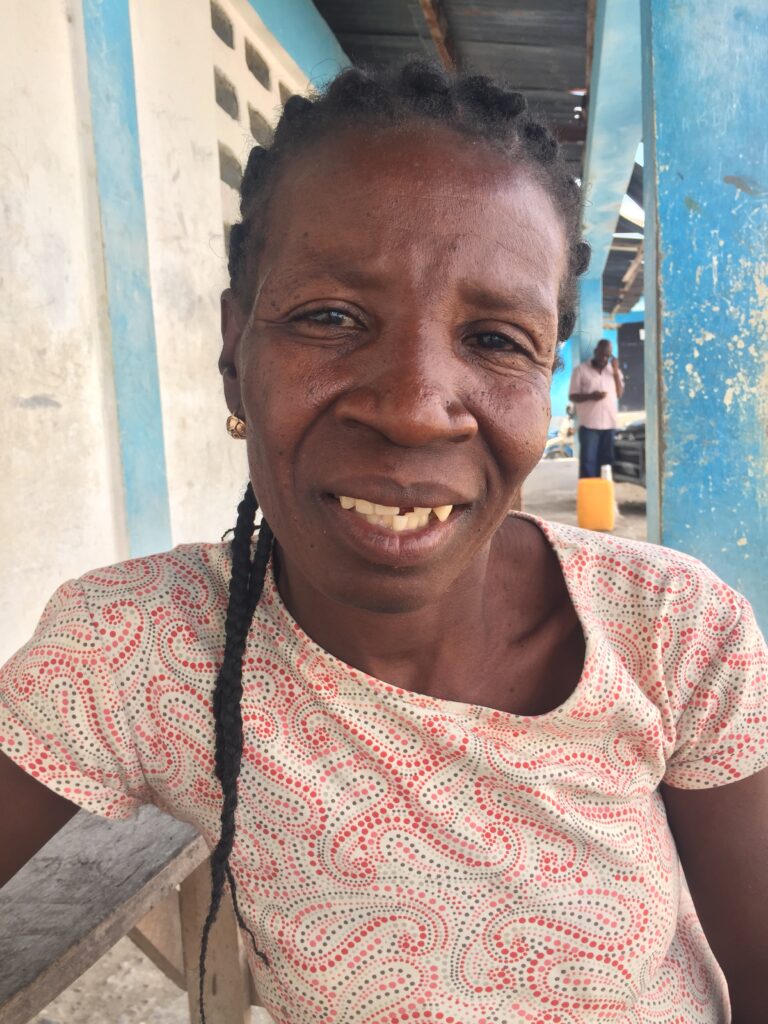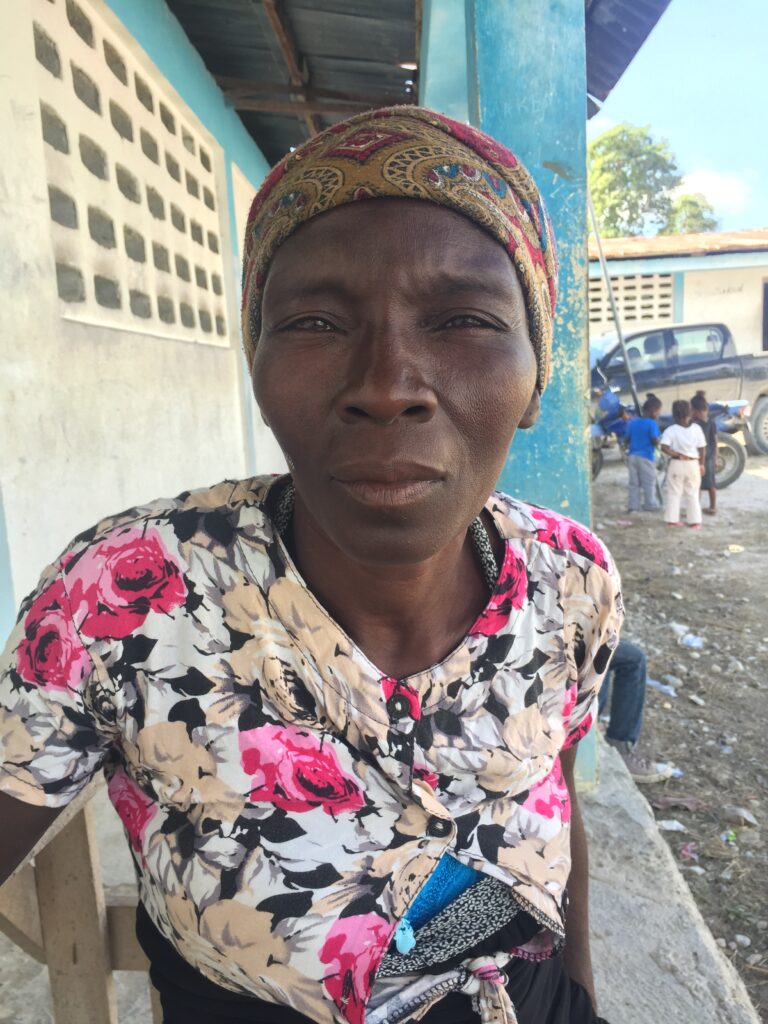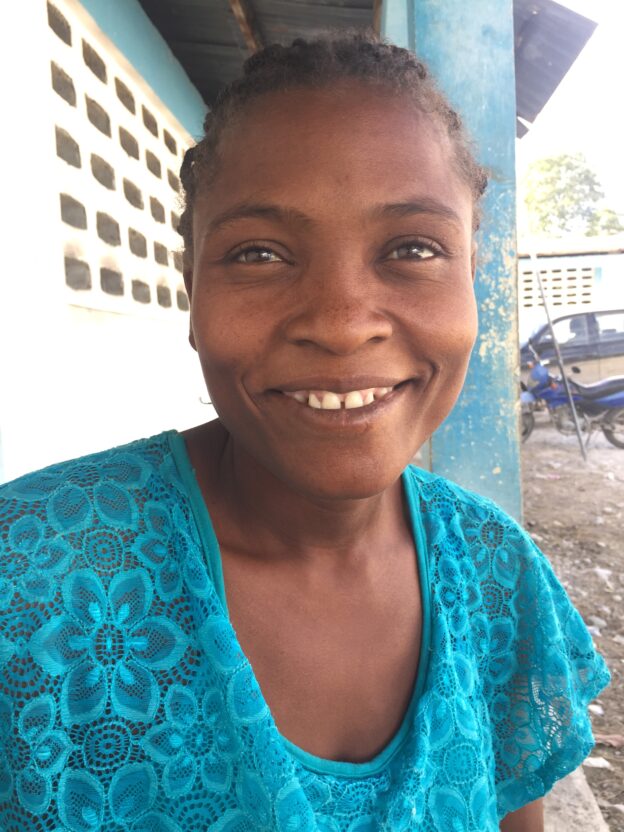Like all the CLM members who live in Lawa, Jeanna has now been a part of the program for seven months. She feels as though she has already made a lot of progress, but when she speaks about what she has accomplished so far, she focuses on her new home.
“Our latrine is finished. We walled it in and installed a door. We’re gathering the wooden support posts we’ll need for the house. We’ll find them, alright. The planks to make a door will be harder.”
That’s because the door will be made of hardwood. Even if she and her partner, Nelso, have a tree they can cut down, they’ll need to pay a pair of workers to cut it into planks. If they don’t have an appropriate tree, they’ll have to find planks the can buy at a price they can afford.
She received two goats from the program, and one is pregnant. She also received a sheep, and though it appeared to be pregnant too, it turned out not to be. She’ll have to wait until it’s in heat again, then cross it with a local ram. She’s happy with the animals, though. “They’re all healthy.”
She tried to start a small business selling rice. “I bought a sack of rice, but some of it ended up feeding my children and some went to customers who bought on credit and never paid.”
She wants to start over again when she has enough money. She is waiting to harvest her pigeon peas. She expects to bring in 2500 to 3000 gourds of peas. That’s about $33, and she would like to use the money to start a new business. This time she has a different plan. She wants to buy a few sacks of something from local farmers. Charcoal, maybe. She’ll sell it retail, in small piles, in the market in Gwomòn.
She sounds as though she knows what she wants to do with money, but it isn’t quite true. She wears a cheap, metallic ring, with a large, fake diamond. The ring comes up when she tells me that she owes someone 3500 gourds, and I ask her to explain. Apparently, she recently bought the ring for 7500 gourds, but was only able to pay 4000. The person who sold it to her let her owe the rest. In a way, she knows very well that she shouldn’t have spent that money, but she doesn’t think she had a choice. “I was sick over it. Bondye te kenbe m pou li.”
This is a little hard to translate. It means that God held her for the ring, something like that God intended it for her but more. Almost as though God made it impossible for her to get away from the ring.
In the meantime, she and Nelso are keeping their family fed with whatever they can find in their own gardens. Nelso tries to contribute in other ways, too. Jeanna says that he makes potions, magical remedies based mainly on rum and herbs. “But it’s been a long time since anyone bought anything from him,” she adds.
They are also trying to figure how to send the children to school this year. Six of Jeanna’s seven children could go this year, at least in principle. The baby is still nursing. The three-year-old is probably too young to walk all the way from Lawa to the nearest school, but the other five should go. Jeanna, however, doesn’t think she’ll be able to send more than four. The five-year-old will have to wait.
All this leads to a serious question. Jeanna is only 28. Nelso is a little older, but he’s still young as well. And the couple already has seven children. They’d have eight, but they lost one. As young as she is, it is easy to imagine Jeanna having a bunch more.
She would like to use family planning, and Nelso agrees that they shouldn’t have more kids, but she’s tried the two options she knows how to access, and neither works for her. Both the pill and shots that last three months make her sick. The Partners in Health hospital we work with in Mibalè distributes ten-year IUDs as well, and with a little coordination between our nurse in Gwomòn and our nurse in Mibalè, we should be able to help Jeanna get an IUD if she decides she wants to try one. But the first step is education, so the nurse intends to see Jeanna to explain the option.

Clotude feels lucky. The cactus sap that had gotten into her eye last time I went to see her could have done lasting damage, but thanks to advice from our nurse, she was able to rinse it out thoroughly before any harm was done.
Like Jeanna, she’s focused right now on improving her home. She finished her latrine, and has begun collecting the rocks and the clay she’ll need when they are ready to build the walls of her new house. Her children have been a big help, but she’s also been grateful to other neighbors who’ve shown that they are willing to give her a hand. Cutting out a flat spot in her hillside plot of land to build the house is heavy work. It would have been very difficult for her and her girls. She doesn’t know what she would have done without neighbors, but so far they’ve come through when she needed them. It’s keeping her busy, but she doesn’t mind. “[CLM] didn’t give me building materials so that I could store them at home. I need to do my part, too.”
She thinks her two goats are pregnant. But her sheep has her a little confused. “It’s the first time I’ve had a sheep.” She explained that the sheep started breaking its cord and wandering off whenever it could. It was a neighbor who told her that that was a sign that the ewe was in heat. So, she rushed to take it to a ram, and she’s been watching it ever since. “Its udder has started to drop,” she says, so she thinks it’s pregnant.
She had planned to start a small business as well, but she decided to use the money to buy some of the lumber she needs to build her new house. She now plans to get her business started after she’s finished with her home. She’s not yet sure, however, where she’ll get the start-up capital.
Holding off on starting her business means that, since her weekly stipend ended after 24 weeks, she’s short on cash these days. But she points out that this is a good time of year to be income-free. She has stuff in her garden that she can feed her girls. “We might not have a lot, but I can make sure they get something to eat every day.”

Itana just had to take her little boy to the doctor. He had a bad fever, but he’s feeling much better.
Like the other two women, she’s excited to have a new latrine, even though she has work to do to finish walling off the last side of it. She’s also trying, like Clotude, to have a spot in her yard cut flat so her house can be built, but it’s slow going. She seems to be getting less help than Clotude is.
And one would think she’d get more. Clotude has been a widow for a long time, whereas the father of Itana’s children is still around. He could be helping her. But not only is he unwell, he isn’t around very much. He has two partners, not just Itana. He has four children with a woman who lives in another part of Moulen. According to Itana, he spends most of his time with others, rather than helping her.
Even so, she’s pushing forward. She arranged with a neighbor to buy 5000 gourds’ worth of the lumber she’d need, and the neighbor agreed to take a 2500-gourd deposit. Itana could owe the rest. But when her boy got sick, neighbors advised her to take him to a local healer first, and she spent most of the money buying the home remedies that the healer offered her. She’s hoping that her partner will be able to replace the money so she can buy the lumber. He sometimes gets work in one of the local sugarcane mills. But Itana knows she’ll need to be patient. She says the work at the mills pays very little.
She’s excited that her goats are pregnant, but like both other women, she’s a little unsure about her ewe. She’s never raised sheep, and so she isn’t familiar with the key signs.

Resilience best describe these women. They live in a desperate area of Haiti that can basically force you to give up. It’s good to read that their homes and latrines are important, their lives will improve once they feel safer and secure. However, their true priorities will manifest after a few more months in the CLM program with the help of their case managers. Jeanna ‘s need for a ring is a frivolous want and not a need. But she is young and shiny things that she could never attain before attracts her. The women will succeed in the program and I look forward to reading about their graduation.